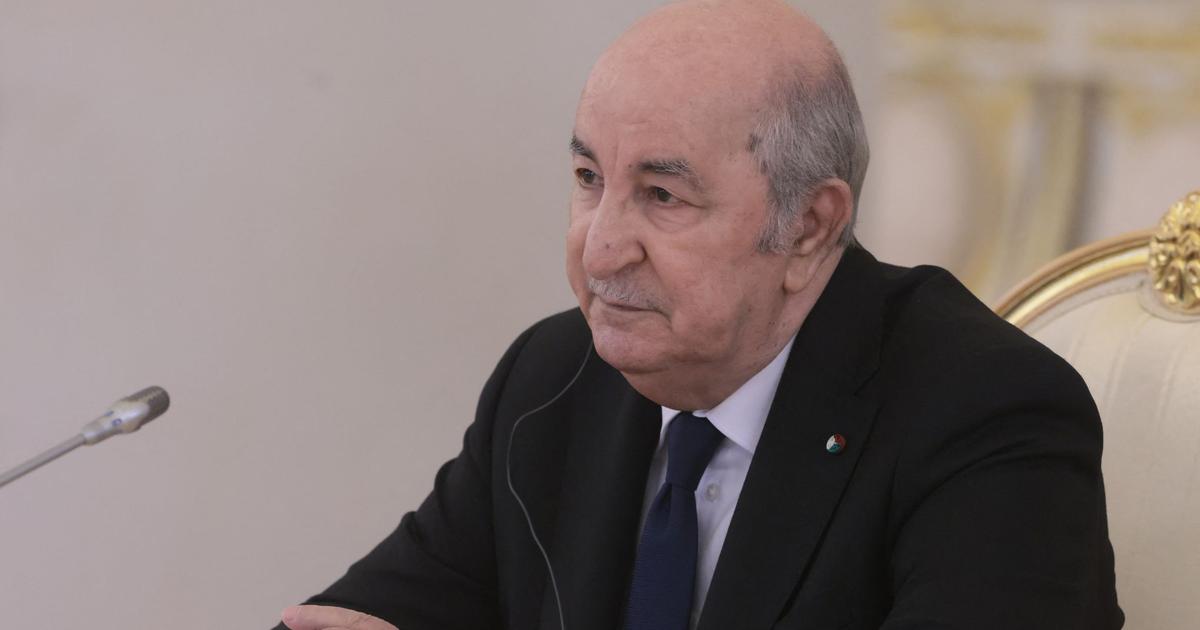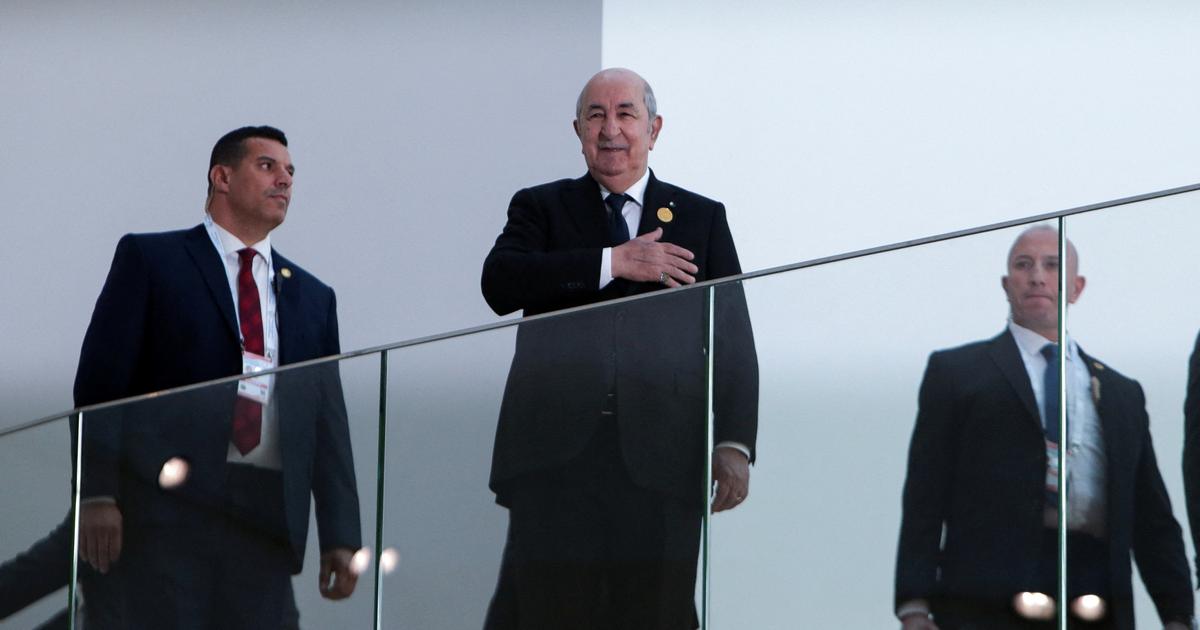Parade with traditional Algerian costumes before the summit of the Arab League on November 1 and 2 in Algiers. MOHAMED MESSARA (EFE)
After three years of breaking with the recent political past only placated by covid-19, Algeria has tried to re-emerge on the international scene as host of the Arab League summit, the first held after the pandemic.
The Hirak revolution, the massive protest movement that forced the downfall of President Abdelaziz Bouteflika in 2019 as he tried to perpetuate himself in office and prolong his two decades in power, is now history.
The triumphalism of the Algerian press contrasts with the effective results of the regional conclave of the past days 1 and 2, and with the limited attendance of heads of State and Government to a forum that has not been able to hide the open gaps between its members.
Since the rotating presidency, Algeria has struck diplomatic balances in the presence of Morocco, with which it broke off relations more than a year ago.
Although King Mohamed VI finally declined the invitation, his Foreign Minister, Naser Burita, did go to Algiers, where he sent a proposal from the monarch to the Algerian president, Abdelmayid Tebún, to start a direct dialogue in Morocco.
"A meeting of all the Arab states is, in itself, a sign of good will," clarifies the Moroccan writer Tahar Ben Jelloun.
"But before meeting, it would have been necessary to solve the problems left in suspense between neighbors," the novelist clarified in an article published on the digital portal
Le 360
.
Observers in Algiers point out that the presidency of Tebun has returned prominence to the North African country.
Algeria is trying to reposition itself — as happened with the visit last August by French President Emmanuel Macron — after the absence of foreign projection at the highest level in the last years of Bouteflika's mandate, seriously ill.
The facilitated access to the international press is also seen as a gesture of openness in a country that is usually closed to foreign media.
The Algerian political analyst Tarek Hafid considers that after more than a decade of disagreements and misunderstandings between Rabat and Algiers, and after the rupture of relations aggravated by the dispute over Western Sahara, "the conditions for a rapprochement between the two countries do not exist. , that they are going to have to wait for some time”.
An editorial article by the official APS news agency published after the conclusion of the summit described the "supposed invitation" to the Algerian president as an "invention" of the Moroccan foreign minister.
"It is nothing more than a clumsy justification for the king's last-minute evasion," added the APS in the key of a diatribe amid the official silence, for now, of Algerian diplomacy.
In addition to the formal support expressed for the Palestinian cause, without expressly condemning Israel for not disturbing relations with the Jewish State of 6 of its 22 member countries, the Arab League has addressed urgent issues in Algiers, such as food security due to war in Algeria, or strategic, such as the embryo of a Customs Union.
“The Arab League is quite representative of the States, but very little of their societies, which have changed a lot”, examines the summit Abdelaziz Rahabi, former Minister of Culture and former Ambassador of Algeria in Spain.
"Citizens have become political actors through social networks," says Rahabi, 68, considered a possible bridge between the system in power, heir to the single-party era, and civil society in Algeria.
"The Arab League is late, it does not represent society on fundamental issues such as human rights or freedom of expression," he points out.
The Hirak, the peaceful, spontaneous and inter-class Algerian movement, was held back by the lockdowns of the pandemic.
Although he did not know how to become a political alternative either.
Rahabi himself tried to lead an initiative that would bring together his currents, both the opposition parliamentary tradition and the groups that emerged from the street.
With the exception of the Movement of the Society for Peace (MSP, Islamist), the opposition boycotted the 2021 legislative elections and gave the sword to Parliament.
The Moroccan Foreign Minister, Naser Burita, on day 1 at the Arab League summit in Algiers. MOHAMED MESSARA (EFE)
In the historic colonial center of Algiers, renewed white after years of abandonment, citizens celebrated with festive marches on the 1st the 68th anniversary of the start of the war of liberation against the power of the French metropolis.
The event brings together almost all Algerians every year, despite their differences, as an identity reference.
The social tension prior to the outbreak of Hirak, with a barrel of oil then below 30 dollars, is no longer observed while a barrel of crude approaches 100 dollars.
State income from hydrocarbons will experience an increase of 45% this year compared to 2021, as announced by the Algerian Minister of Energy and Mines, Mohamed Arkab.
“Now we don't have problems of political violence, what we need is to control public wealth.
The State has many resources and is making a lot of money, but the people do not.
Revenues from gas and oil have grown, and so have the prices of milk, cereals, medicines... Here we import almost everything and we are not exactly experiencing a period of prosperity”, replies the retired diplomat Rahabi.
“Algeria experienced a true cultural revolution in 2019 that offered us the hope of achieving a more modern and democratic country.
Something truly unique in our history, but that hope has been disappointed”, argues the same former minister, who goes from expressing himself in perfect French to fluent Spanish after having served as ambassador in Mexico and Madrid.
He believes that the government had to choose between accompanying the popular movement or remaining in its place.
"Stability was privileged in the face of change, which is why the Algeria of today is not far from that of 2019," he lamented.
In contrast, foreign observers in Algiers highlight the fight against corruption undertaken after the Hirak protests.
Two former prime ministers are in jail, along with several ministers and governors.
Even a former president of the almighty Sonatrach, the state hydrocarbons company, is on trial.
And civil society, although it has not achieved a greater democratic opening after the 2019 mobilization, is now thriving in areas such as the participation of women or the protection of migrants.
Civil society demands
"The ceiling of the Hirak's demands was much higher than what power was willing to offer," said Nuredín Ben Brahem, president of the Adwaa human rights association, at his organization's headquarters in Algiers.
"The State has been consolidated while the demands for change have faded," summarizes this representative of Algerian civil society.
His NGO now works to care for 900 refugees and 10,600 asylum seekers, mostly sub-Saharan, although it also welcomes Syrians and Palestinians, commissioned by the United Nations High Commissioner for Refugees (UNHCR).
"Political instability, food insecurity and climate change remind us every day of the reasons why migration flows will not cease to exist despite borders," argues Ben Brahem.
"And Algeria is not just a transit country," he warns, "because there are many 'harraga' (candidates for irregular immigration) who seek to escape the country in a small boat."
The Hirak seems forgotten, like a great lost opportunity that Algeria did not know how to take advantage of.
More than two hundred of its militants and activists are still detained on charges of belonging to terrorist organizations, according to international human rights NGOs.
Those who have been released prefer to remain silent.
“There is less corruption now, it is true.
But politically we are the same as in the time of Bouteflika.
There is no more space for freedom of the press, of expression, of party participation.
There is almost no political life in Algeria”, recapitulates the former minister and diplomat Rahabi.
“There is great resistance to reforms within the State.
The Administration, which has tremendous power due to all the prerogatives it accumulated under Bouteflika's mandate, is still a very powerful apparatus”, highlights the political leader, a supporter of an Algerian third way.
Since belonging to the generation born with the struggle for independence, Rahabi admits that Algeria has experienced "a long history of ruptures, some of them violent."
He now defends a process of democratic change without violence, through dialogue between the main political forces and the Government.
He calls it “entering political modernity;
in a country much more open to the ideas of the rest of the world”.
A transition, in short.
“Unfortunately”, he adds, “three years later, we have achieved very little of what we dreamed of in the popular protests of Hirak”.
Follow all the international information on
and
, or in
our weekly newsletter
.
Subscribe to continue reading
read without limits
Keep reading
I'm already a subscriber

/cloudfront-eu-central-1.images.arcpublishing.com/prisa/SQD7CI34IJMJ5OAFFG355H2VRI.jpg)
/cloudfront-eu-central-1.images.arcpublishing.com/prisa/VFQFJYOVGFFAJOTNW2NNJRUS3I.jpg)



/cloudfront-eu-central-1.images.arcpublishing.com/prisa/CXNNVU7NQJGRBKM7CSDDCQS3UA.JPG)

/cloudfront-eu-central-1.images.arcpublishing.com/prisa/KEJKPQHVMJAPJONPEDK42JL56U.jpg)
